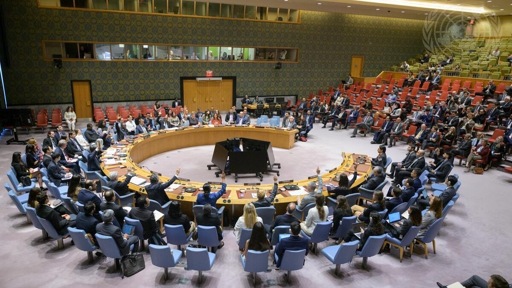The United Nations Security Council (UNSC) voted to reimpose severe and comprehensive international economic sanctions on Iran intended to exert maximum pressure on the country’s economy, on Friday, September 19, following pressure from the UK, France, and Germany (E3). With sanctions looming over the West Asian nation, European leaders suggested there may be a chance for a last-minute negotiated settlement.
E3 wrote a letter to the UNSC in August demanding snapback sanctions against Iran by the end of this month in the absence of a negotiated deal on its nuclear program.
Iranian Foreign Minister Abbas Araghchi, however, claimed that the Europeans were reluctant to consider the latest plan Iran had presented to them and accused them of trying to find excuses to avoid a diplomatic solution to the issue.
Before the vote took place, Araghchi implored the European powers to choose diplomacy over confrontation.
E3 should avoid an “unnecessary and avoidable crisis in the coming days” by seriously considering Iran’s “reasonable and actionable plan” on the nuclear program, he said on Thursday, September 18.
Araghchi was reporting the outcome of his recent phone conversation with the foreign ministers of the three European signatories of the Joint Comprehensive Plan of Action (JCPOA), or the Iran nuclear deal.
The UN resolution 2231 of 2015, which removed all the international sanctions on Iran imposed prior to the signing of the deal, allows the reimposition or “snapback” of sanctions in the event of Iranian violations of the deal’s provisions.
However, Iran maintains that it never violated the deal. The US withdrew from its commitments under the deal in 2018, subsequently imposing sanctions on Iran. Although it gradually walked back its compliance with the JCPOA over time, Iran cited the provisions of the deal which protected its right to do so in the event of the noncompliance of other signatories, and especially the imposition of sanctions.
For many years, Iranian leaders called on the US to return to the deal and also pushed the other signatories to uphold their duty under the deal to hold the US accountable to the agreement.
Iranian proposal is a way forward for all
The JCPOA, or the Iran nuclear deal, was signed in 2015 by five permanent members of the UN+Germany and Iran, to restrict Iran’s nuclear program in return for the withdrawal of sanctions.
Recently, E3 accused Iran of violating the provisions of the JCPOA, despite Iran’s assertion that its actions, following the unilateral withdrawal of the US from the deal, were protected by the deal’s own provisions.
Iran had suspended its cooperation with the IAEA following its failure to condemn the US-Israeli aggression on its nuclear sites in June, which violated IAEA rules and provisions of the Nuclear non-Proliferation Treaty (NPT).
Wednesday’s phone call was a result of Iran signing a deal with the IAEA last week to allow partial access to IAEA inspectors to its nuclear sites.
Araghchi listed the various initiatives Iran has developed to pave the way for diplomacy to avoid more sanctions, citing the deal with the IAEA. Iran pointed out that agreeing to work with the IAEA again despite its nuclear sites being illegally bombed by the US and Israel demonstrates its commitment to diplomacy.
Araghchi claimed that the new plan “addresses genuine concerns and is mutually beneficial” and “a way forward” for all parties.
UNSC must intervene
E3 had recently proposed to delay the snapback provisions for six months on the condition that Iran allows full access to International Atomic Energy Agency (IAEA) inspectors to its nuclear sites and starts direct negotiations with the US.
Claiming that “Iran cannot be the sole responsible actor”, Araghchi questioned E3’s intentions and the effectiveness of their diplomacy. He demanded the UN Security Council to directly intervene so that diplomacy takes precedence over confrontation.
Araghchi hinted that although French President Emmanuel Macron explicitly acknowledged the significance of the Iranian plan, he expressed his reluctance to engage with it further, indicating some external pressure.
Araghchi also dismissed European allegations about the division in the Iranian government, calling it an excuse to avoid engagement. He claimed that the Foreign Ministry of Iran has the full confidence and backing of all power centers in Iran, including the Supreme National Security Council.
Iranian resolution in Vienna
Meanwhile, during the ongoing 69th IAEA General Conference in Vienna, Iran proposed a resolution demanding the prohibition on all attacks or threats to attacks on nuclear facilities under the safeguard of the IAEA.
Speaking during the conference, Reza Najafi, Iran’s permanent representative at Vienna, claimed that member countries are under tremendous US pressure to not vote in favor of the resolution and demanded a strong collective response to Israeli and US violations of IAEA rules and international law.
Russia expressed its opposition to snapback sanctions, claiming the call is “illegal, political and destructive” and supported the Iranian resolution.
Speaking on the sidelines of the 69th IAEA General Conference, Russia’s permanent representative to Vienna, Mikhail Ulyanov, called the Israeli and US attacks on IAEA safeguarded Iranian nuclear facilities in June “unprecedented” and demanded the complete end of such acts in future.
The post UN Security Council reimposes comprehensive international sanctions on Iran appeared first on Peoples Dispatch.
From Peoples Dispatch via this RSS feed


